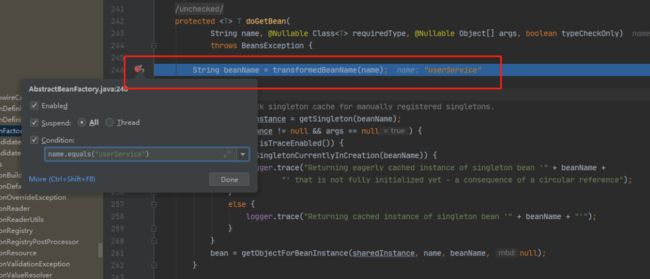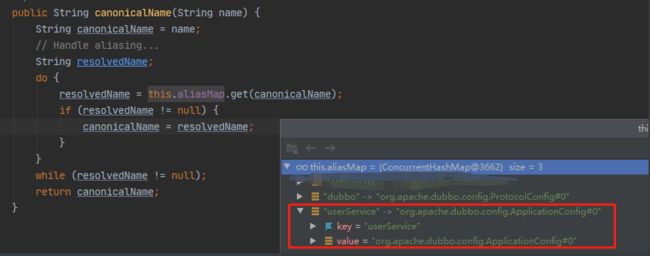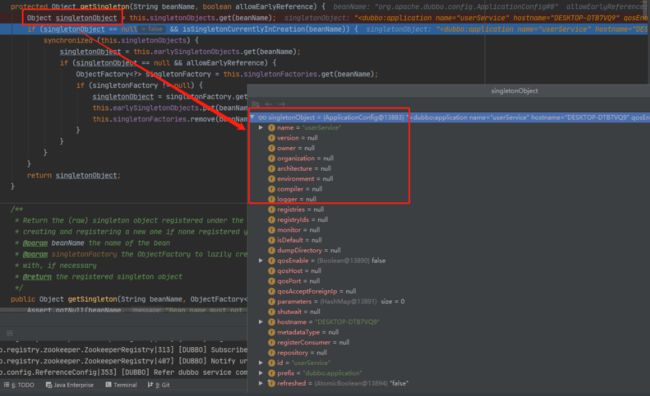Dubbo配置注册中心设置application的name使用驼峰命名法可能存在的隐藏启动异常问题
原创/朱季谦
首先,先提一个建议,在SpringBoot+Dubbo项目中,Dubbo配置注册中心设置的application命名name的值,最好使用xxx-xxx-xxx这样格式的,避免随便使用驼峰命名。因为使用驼峰命名法,在Spring的IOC容器当中,很可能会出现一些导致项目启动失败的坑,例如,会出现这样的异常报错:
org.springframework.beans.factory.BeanCreationException: Error creating bean with name 'userController': Injection of resource dependencies failed; nested exception is org.springframework.beans.factory.BeanNotOfRequiredTypeException: Bean named 'userService' is expected to be of type 'com.xxx.xxx.xxx.service.UserService' but was actually of type 'org.apache.dubbo.config.ApplicationConfig'
在说明该问题之前,首先,需要提一下org.apache.dubbo.config.ApplicationConfig这个类,这是一个Dubbo的应用配置类,它用在哪里呢?
在SpringBoot 2.x+Dubbo项目当中,主流都是使用yaml文件设置项目环境依赖参数,不同的组件,其配置类的实例化各有差异。
Dubbo初始化配置类主要有以下——
| 序号 | 类名 | 用途 | 说明 |
|---|---|---|---|
| 1 | ApplicationConfig | 当前应用配置 | 提供者或者消费者配置当前应用信息,一般以属性name区分各应用 |
| 2 | MonitorConfig | 监控中心配置 | 配置连接监控中心monitor参数 |
| 3 | RegistryConfig | 连接注册中心配置 | 配置Dubbo用到的注册中心 |
| 4 | ProtocolConfig | 服务提供者协议配置 | 配置提供方的远程通信协议 |
| ...... | ...... | ...... | ...... |
这些配置类的实现原理基本大同小异,本文主要以ApplicationConfig配置类做讲解分析。
在yaml配置文件里,Dubbo的配置例子如下——
dubbo:
application:
name: userService
registry:
address: zookeeper://127.0.0.1:2181
timeout: 10000
protocol:
name: dubbo
port: 20880
这个配置可以拆开如下图这样看,便能一眼看懂它们分别属于哪个配置类——
当在yaml文件这样配置后,当项目启动时,会自动获取这些参数,然后初始化到对应的配置类当中,例如,application中的name值就会设置到ApplicationConfig类对象里——
在SpringBoot中,这个ApplicationConfig对象会在普通bean初始化之前,就已经装载到IOC容器当中,以name的值做该bean名,同时,会以name:className的方式存储在Spring的bean别名缓存aliasMap当中,这就出现一个问题,假如该项目当中存在同名bean注解的话,会出现什么样情况呢?
例如,当SpringBoot的Dubbo配置如前边一样,以字符串“userService”做ApplicationConfig的name值,同时,controller层有以下代码——
@RestController
@RequestMapping("/user")
public class UserController {
@Resource
private UserService userService;
......
}
我们可以在IOC容器过程的AbstractBeanFactory类中的doGetBean(String name, @Nullable Class requiredType, @Nullable Object[] args, boolean typeCheckOnly)方法截图处打一个针对userService的断点——
截图里的逻辑,其实是在对注解有@RestController的UserController类做IOC过程中,会对其通过 @Resource设置的属性userService做依赖注入过程,首先,会去bean别名aliasMap缓存当中看是否能查询到,我们进入到transformedBeanName(name)方法底层——
public String canonicalName(String name) {
String canonicalName = name;
// Handle aliasing...
String resolvedName;
do {
resolvedName = this.aliasMap.get(canonicalName);
if (resolvedName != null) {
canonicalName = resolvedName;
}
}
while (resolvedName != null);
return canonicalName;
}
此时,this.aliasMap缓存里已经有值了,主要都是Dubbo相关的,这说明Dubbo会在普通自定义Bean前就做了IOC注入,我们可以看到,前边提到的ApplicationConfig对象class类名,已经缓存在aliasMap当中,其key值,正好yaml配置文件里设置的name值。当以“userService”字符串取aliasMap获取,是可以拿到值的——
但是,这里注意一点,此刻debug这一步doGetBean,理应依赖注入的是UserService类而不是ApplicationConfig类——
然而实际情况是,此时,通过方法Object sharedInstance = getSingleton(beanName)从IOC三级缓存之一的单例池里获取到的则是ApplicationConfig已经初始化成单例bean的对象——
这将会出现什么情况呢?
在 doGetBean方法最后,会做一步这样操作,将需要初始化的bean类型requiredType与通过“userService”从单例池里获取到的实际bean类型做比较——
// Check if required type matches the type of the actual bean instance.
//检查所需类型是否与实际bean实例的类型匹配
if (requiredType != null && !requiredType.isInstance(bean)) {
try {
T convertedBean = getTypeConverter().convertIfNecessary(bean, requiredType);
if (convertedBean == null) {
throw new BeanNotOfRequiredTypeException(name, requiredType, bean.getClass());
}
return convertedBean;
}
catch (TypeMismatchException ex) {
if (logger.isTraceEnabled()) {
logger.trace("Failed to convert bean '" + name + "' to required type '" +
ClassUtils.getQualifiedName(requiredType) + "'", ex);
}
throw new BeanNotOfRequiredTypeException(name, requiredType, bean.getClass());
}
}
结果可想而知,一个是UserService类,一个是ApplicationConfig类,两者肯定不匹配,那么就会执行抛出异常throw new BeanNotOfRequiredTypeException(name, requiredType, bean.getClass());
public BeanNotOfRequiredTypeException(String beanName, Class requiredType, Class actualType) {
super("Bean named '" + beanName + "' is expected to be of type '" + ClassUtils.getQualifiedName(requiredType) +
"' but was actually of type '" + ClassUtils.getQualifiedName(actualType) + "'");
this.beanName = beanName;
this.requiredType = requiredType;
this.actualType = actualType;
}
debug到这一步,其错误提示,刚好就是——
Bean named 'userService' is expected to be of type 'com.xxx.xxx.xxx.service.UserService' but was actually of type 'org.apache.dubbo.config.ApplicationConfig
因此,就说明一个问题,当Dubbo应用配置application的name使用驼峰命名,例如,本文中的userService,刚好又有某个地方用到类似这样注解的属性依赖注入 private UserService userService,那么,项目在启动过程中,就会出现类似本文中提到的项目启动异常。
可见,在application的name值使用xxx-xxx-xx这样方式命名会更好些。






